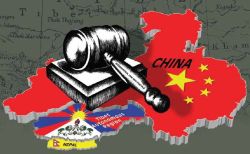“Since Tibet is not the same as China, it should ultimately be the wishes of the people of Tibet that should prevail and not any legal or constitutional arguments. That, I think, is a valid point. Whether the people of Tibet are strong enough to assert their rights or not is another matter. Whether we are strong enough to see that is done is also another matter. But it is a right and proper thing to say and I see no difficulty in saying to the Chinese government that whether they have suzerainty or sovereignty over Tibet, surely, according to any principles, the principle they proclaim and the principles I uphold, the last voice in regard to Tibet should be the voice of the people of Tibet and nobody else.”
–
Jawaharlal Nehru, 7 December, 1950
Lok Sabha (Indian Parliament)
A scholarly examination of the historical validity of the Chinese claims on Tibet. The writer highlights how the UN General Assembly resolution of December 1961 accepted the Tibetan people’s right to self-determination. The writer draws attention to the Treaty signed by Tibet and Mongolia in January 1913. Both countries recognised each other’s independence. The Mongolians turned to Russia for guidance and protection, the Tibetans to Britain and later India for the same. Mongolia is today an independent country – a condition extracted by the Soviet leaders from Nationalist China and then the People’s Republic, regardless of the fraternal ties between them. Tibet is a country and culture on the verge of extinction, a sorry reflection on the Indian leadership.
The plan of study is to divide Tibetan history into three parts: one, prior to the 19th century, the second from the 19th century to the beginning of the 20th century and finally, the 20th century itself, including and bringing the study up to the current period of the 21st century.
The period before the 19th century is important, of course, but so much happened in the subsequent years that the relevance of the evidence from further back becomes debatable. Much of the evidence from the Chinese side is also sketchy over this period and consists of tokens of control which are not relevant to the current practice of diplomacy or international law. For instance, the claim that they appointed representatives [who were considered as Ambassadors by the Tibetans] or awarded titles is unconvincing. Britain still awards titles to countries like Australia and even appoints the Governor-General. But no one would accept any claim of British sovereignty over Australia. Besides, China itself was ruled during this period by the Manchus, who were themselves non-[Han] Chinese, so it is questionable whether their territories may logically be considered Chinese. It would be akin to India claiming Afghanistan because the Mughals controlled that territory or Burma because the British did.
The 19th century however, saw some important events and these are important indications of the nature of the relationship between Tibet and China. Two events stand out. The first was the relationship between Tibet and Nepal. Nepal invaded Tibet [its second invasion in the 19th century] in 1854 and the Chinese central authorities did nothing to help Tibet, which was forced to conclude a Treaty in 1856 with Nepal which provided for a tribute – the sum of Rs 10,000 annually, a large sum those days – to be paid by Tibet. Although the Treaty paid obeisance to the Emperor of China, the fact is that Beijing neither helped in the war, not did it play any role in the Treaty signing. This is not the attribute of a sovereign. Nonetheless, the Beijing authorities use this Treaty, among others, to lay claim over both Tibet and even Nepal. The latter is dormant now, but the potential for trouble exists and needs to be recognised.
This particular aspect of Tibetan sovereignty was brought out by the Indian officials in their negotiations with China which took place in the late 1950’s and is reflected in the following extract from the Officials’ Report: 1960
“During the 300 years prior to 1950, Tibet, whatever her status, had enjoyed the right to sign treaties and have direct dealings with her neighbours on boundary questions, was clearly established by history. The Indian side had already drawn attention to the treaties of 1684 and 1842 signed by Tibet with Ladakh. In 1856, she signed a treaty with Nepal and the People’s Government of China themselves recognised the validity of this treaty, because they felt it necessary to abrogate it in their treaty, signed exactly a hundred years later, in 1956 with the Nepal Government. It was asserted by the Chinese side that the Chinese Amban in Tibet had assisted in the conclusion of the 1856 treaty. This, too, was an incorrect statement of facts; but even if true, it would only corroborate the Indian position that China recognised the treaty-making powers of Tibet. For it would mean that China assisted Tibet in directly negotiating a treaty which, among other things, granted extra-territorial rights to Nepal.”
It is worthwhile reflecting upon the Tibet-Mongolia Treaty of January 1913. Both countries recognised each other’s independence. The Mongolians turned to Russia for guidance and protection, the Tibetans to Britain and later India for the same. Mongolia is today an independent country – a condition extracted by the Soviet leaders from Nationalist China and then the People’s Republic, regardless of the fraternal ties between them. Tibet is a country and culture on the verge of extinction, a sorry reflection on the Indian leadership
If the Chinese felt the need to abrogate the Treaty in 1956, it means that they acknowledged its validity till the time of abrogation.
For the second event, the clock needs to be turned back a little further. A few years earlier, starting in 1841, a war broke out between Tibet and the Dogra rulers of Kashmir. This resulted in Letters of Agreement being signed between the warring parties, under which the boundaries between Ladakh and Tibet were clarified and recognised and trade relations were regularised. Ladakh also agreed to pay an annual tribute to Tibet. Again the central authorities played no role in the entire episode. The importance of this agreement between Ladakh and Tibet in further establishing Tibetan sovereignty is also brought out in the Officials’ Report, as quoted above.
 |
| Click to enlarge |
Another aspect worth mentioning is the attempt at about this time by Beijing to regulate the selection of the Dalai Lama. This happened in 1793 and the central part of the regulations introduced by Beijing read as follows: “When the reincarnate boy has been found, his name will be written on a lot, which shall be put into a golden urn bestowed by the central government. The high commissioners will bring together appropriate high-ranking Living Buddhas to determine the authenticity of the reincarnate boy by drawing lots from the golden urn.” However, the Tibetan authorities ignored this and in 1804, the Ninth Dalai Lama was selected in the usual way by the Regent.
The final piece of evidence dates to the last three decades of the 19th century and involves British attempts to establish direct relations with Tibet. A bit of background would be helpful here. The strategic setting was the rapid expansion of two major Empires – the British and the Russian – towards the heart of Asia. The British Empire expanded west and north from Calcutta, the Russian south and east from St Petersburg. They met, or drew close, along the Central Asian redoubts. Tibet at this time was playing host to the famous historical figure Agvan Dorjiev, a Buryat monk who arrived in Lhasa in 1880 and soon became a debating partner of the Dalai Lama. The contemporary British media were replete with articles about the Russian advance into Tibet through the agency of Dorjiev. For long afterwards, it was doubted whether the Russians and Dorjiev were indeed playing any political role, but recent disclosures make it clear that there were indeed strategic and military matters under consideration between Russia and Tibet, through the mediation of Dorjiev. However, the British had their own plans and fears and turned to the Chinese Empire in order to use its supposed suzerain status to work their strategy in Tibet.
The British had been trying to open relations with Tibet at this time, mainly to counter the Russian moves described briefly above and were doing this by attempting to involve the Chinese on their side. With this aim they signed an agreement in 1876 [the Chefoo Agreement the main objective of which was to let the British missionaries enter China, only one paragraph was about Tibet], but the Tibetans refused to accept the validity of this agreement as far as they were concerned and refused to be bound by its terms. A decade and a half later, they tried again through a second agreement with China, the Convention of March 1890, this time in order to regulate the boundaries between Sikkim and Tibet, as well as [through the Annex] to regulate trade between British India and Tibet. However, this agreement, like the previous effort by the British to work through the Chinese, did not succeed either and for the same reason. The Tibetans refused to acknowledge the validity of any treaty or arrangement that did not directly involve them. Meanwhile, they were steadily moving to accept Russian protection, under the guidance of Dorjiev. The Russians were already emerging as perhaps the major strategic adversary to the British in Asia. Accordingly, after having waited for the Beijing connection to deliver, the British were forced to conclude that this was not going to work and they had to move independently and directly on Tibet. This was the genesis of the Younghusband expedition in 1903-04. The spur was the failure of Beijing to deliver on its part of the agreements signed in the late 19th century and the real reason was the success of the Russians in dealing directly with Tibet. The Russians did not entirely ignore Beijing and did sign a separate agreement with China, but it was clear that they were focusing on working directly with Tibet, which was responding positively.

 von
von 


